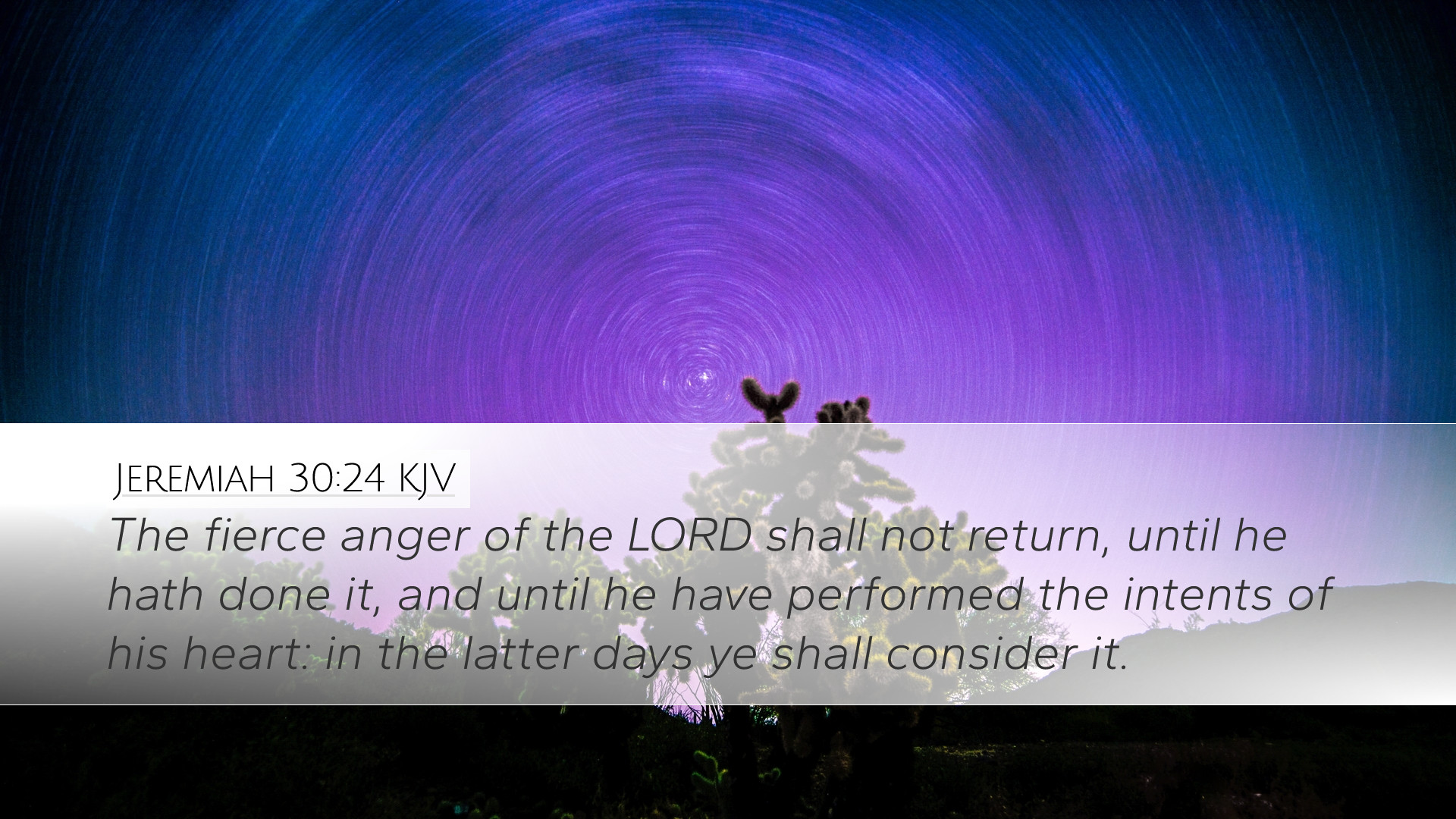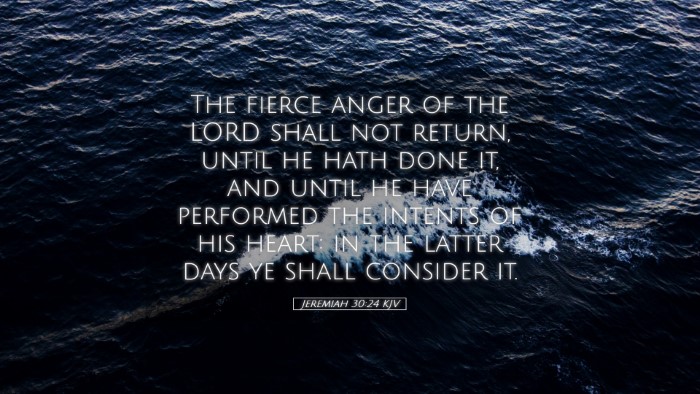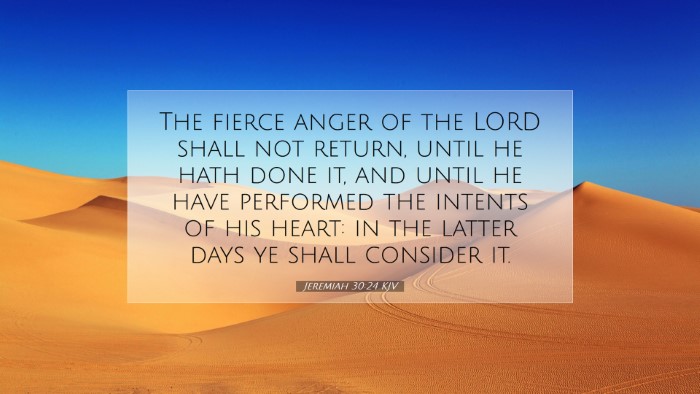Jeremiah 30:24 - Commentary Overview
The verse Jeremiah 30:24 states, "The fierce anger of the Lord shall not return, until he hath done it, and until he hath performed the intents of his heart: in the latter days ye shall consider it." This verse encapsulates a profound statement about God's sovereign will and the certainty of His plans amidst the backdrop of coming judgment and restoration.
Introduction to the Context
To properly understand Jeremiah 30:24, one must consider its context within the Book of Jeremiah. This book foregrounds the prophetic ministry of Jeremiah during a tumultuous period for Israel, addressing themes of judgment, restoration, and hope. Chapter 30 specifically sets a tone of eventual restoration after the Babylonian captivity, highlighting the transition from despair to hope.
Insights from Public Domain Commentaries
Matthew Henry’s Commentary
Matthew Henry emphasizes the gravity of God's anger, noting that it is not capricious but purposeful. He interprets the phrase "the fierce anger of the Lord" as reflecting God's just response to the sins of Israel. Henry notes that God's anger has a divine purpose; it will not be placated until God's intentions — for judgment followed by sorrowful restoration — are fully realized.
Furthermore, Henry points out that God's anger will eventually lead to a phase of deep contemplation within Israel, stating that "in the latter days ye shall consider it." He interprets this as a prophetic reference to a future time when the people would recognize God's work in their history, leading them to genuine repentance and a better understanding of God's just nature.
Albert Barnes' Commentary
Albert Barnes provides a thorough exegesis on the implications of God’s intent in Jeremiah 30:24. He notes that the "fierce anger" signifies God's displeasure for sin but ultimately leads to the performance of His will concerning redemption and restoration. Barnes stresses that while divine judgment seems overwhelming, it is temporally fixed, leading toward a promised reconciliation.
Moreover, Barnes highlights the concept of "latter days" as an eschatological promise. In his view, this signifies not merely the immediate restoration post-exile but also a broader prophetic vision concerning the future of Israel and the advent of the Messianic age. He echoes the note that true reflection on God’s ways comes amidst trials, serving as a lesson for believers on the importance of acknowledging God's sovereignty in times of distress.
Adam Clarke's Commentary
Adam Clarke explores the emotional and spiritual ramifications of this passage, reflecting on how God's fierce anger leads to a necessary purification process for Israel. He suggests that the intense feelings embodied in God's wrath are ultimately a demonstration of His holy love, designed to achieve righteousness within His people.
Clarke amplifies the idea of “considering” the manifestations of God's actions in times of restoration. He suggests this reflects a natural progression toward gaining deeper insights about God's character and the reliable certainty of His promises. Clarke contends that this verse serves as an invitation to the faithful to engage thoughtfully with God's lessons, lest they leave a legacy of ignorance about His righteous judgments.
Theological Implications
The theological weight of Jeremiah 30:24 extends beyond historical Israel and invites contemporary readers to grapple with the nature of God’s justice and mercy. It emphasizes a core theological assertion that God’s purposes cannot be thwarted by human actions — a comforting truth for nations and individuals alike.
- The Sovereignty of God: The verse points toward the inescapable authority of God over historical events, opposing any notion that human sinfulness can derail divine plans.
- Transformation through Judgment: It reinforces that God’s anger is remedial, aimed at bringing about repentance and a return to a covenant relationship with Him.
- Hope in Restoration: The promise of “considering” in the latter days reflects God's ultimate intent for His people to reconcile with Him, serving as a foundation for future restoration.
Application for Today’s Believers
For pastors, students, theologians, and Bible scholars, Jeremiah 30:24 offers a deep well of insights regarding God's plans for judgment and restoration. It serves as a reminder that while God’s anger against sin is real, it is coupled with hope and future redemption.
Pastoral applications may include encouraging congregations to see adversity as an opportunity for growth in faith and understanding of God’s character. The message is one of profound hope founded on the assurance that God will fulfill His promises, encouraging believers to trust in His divine timetable.
Furthermore, scholars might reflect on the implications of this passage in their understanding of Old Testament prophecy and its fulfillment in Christ, who embodies the ultimate restoration of God’s people. Engaging with this text can fuel deeper theological discussions about sin, judgment, and the unfolding narrative of redemption within Scripture.
Conclusion
Jeremiah 30:24 encapsulates a critical juncture in the dialogue between God and His people — a declaration of righteous anger oriented towards ultimate restoration. By examining the insights from Biblical commentators and considering theological, pastoral, and scholarly applications, we gain a clearer understanding of both God’s character and His unwavering commitment to His people across the ages.


